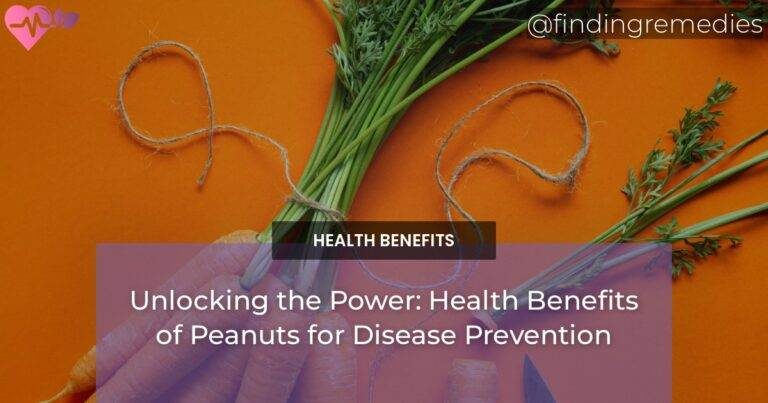Peanuts are a popular snack worldwide and are a staple in many cuisines. They are not only tasty but are also packed with nutrients that are essential for good health.
In this article, we will delve into the many health benefits of peanuts, their nutrition profile, the natural compounds found in them, and how to store and prepare them properly.
Table of Contents
Nutrition Profile of Peanuts
Peanuts are a rich source of macro and micronutrients. They are an excellent source of plant-based protein, monounsaturated fats, vitamins, and minerals.
- 1 ounce of peanuts (28 grams) contains:
- Protein – 7 grams
- Fat – 14 grams
- Carbohydrates – 6 grams
- Fiber – 2.4 grams
- Vitamin E – 21% of the RDI
- Vitamin B3 – 19% of the RDI
- Vitamin B6 – 9% of the RDI
- Folate – 8% of the RDI
- Copper – 24% of the RDI
- Manganese – 29% of the RDI
- Phosphorus – 13% of the RDI
- Raw vs Roasted Peanuts
Raw peanuts have a higher nutrient content than roasted peanuts. However, roasted peanuts have a more intense flavor and are easier to digest. The effect of cooking on nutrient content is dependent on the cooking method and duration.
Natural Compounds in Peanuts
Peanuts contain a variety of natural compounds that have numerous health benefits.
Polyphenols and Flavonoids
Polyphenols and flavonoids are antioxidants that help reduce inflammation in the body and protect against chronic diseases.
Resveratrol
Resveratrol is a natural compound found in peanuts that has been shown to have anti-cancer properties.
Beta-sitosterol
Beta-sitosterol is a plant compound that can help reduce cholesterol levels and improve heart health.
Antioxidants
Antioxidants in peanuts help protect the body against oxidative stress and inflammation.
Health Benefits of Peanuts
Lowering risk of heart disease
Consuming peanuts has been shown to reduce the risk of heart disease due to their high content of monounsaturated fats and antioxidants.
Reducing inflammation and oxidative stress
The natural compounds in peanuts help reduce inflammation and oxidative stress in the body, which can lead to chronic diseases such as cancer and heart disease.
ALSO READ
Prevention of type 2 diabetes
Peanuts have a low glycemic index and can help regulate blood sugar levels, thereby reducing the risk of type 2 diabetes.
Improving cognitive function
The nutrients and natural compounds in peanuts can help improve brain function and prevent cognitive decline with age.
ALSO READ
Aiding in weight loss
Peanuts can help with weight loss due to their high protein and fiber content, which can increase satiety and reduce calorie intake.
Lowering the risk of cancer
The natural compounds found in peanuts have been shown to have anti-cancer properties and can help reduce the risk of certain types of cancer.
Types and Varieties of Peanuts
There are three main types of peanuts: Spanish, Runner, and Virginia. Spanish peanuts are used primarily in peanut butter, while Runner and Virginia peanuts are used for roasting and snacking. Organic peanuts are grown without the use of pesticides and can be a healthier option than conventional peanuts.
Peanut butter is a popular way to consume peanuts and is a good source of protein and healthy fats. However, it is important to choose a natural peanut butter without added sugars or oils.
Proper Storage and Preparation
Peanuts should be stored in an airtight container in a cool, dry place to prevent spoilage. They can be consumed raw, roasted, or boiled, and can be used in a variety of recipes such as salads, stir-fries, and baked goods.
Processing methods such as roasting and boiling can affect the nutrient content of peanuts. Roasting can cause some nutrient loss, while boiling can increase the bioavailability of some nutrients.
Risk Factors and Disadvantages
Although peanuts have numerous health benefits, there are also potential risks and disadvantages.
Potential allergies
Peanut allergies are common and can cause severe reactions in some people.
Aflatoxin contamination
Aflatoxins are naturally occurring toxins that can contaminate peanuts and can be harmful to human health.
Overconsumption and its effects
Overconsumption of peanuts can lead to weight gain and other health problems. It is important to consume peanuts in moderation as part of a balanced diet.
Conclusion
Peanuts are a nutritious and delicious food that can benefit overall health when consumed in moderation. They are a good source of plant-based protein, healthy fats, vitamins, and minerals. Consuming peanuts can help reduce the risk of heart disease, type 2 diabetes, and cancer, improve cognitive function, aid in weight loss, and more. So, go ahead and include peanuts in your diet in a variety of ways to reap their many health benefits!

